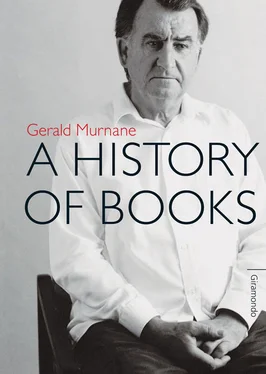Do not suppose that a few moments of intense feeling of themselves revealed much to me. But after I had reflected for long on the events just described, I began to foresee the peculiar course that my life would take in the future: I would seek in books what most others sought among living persons.
I reflected as follows. My reading about the personage in the book had caused me to feel more intensely than I had previously felt for any living person…At this point, dear niece, you may be preparing to revise your previous good opinion of me. Please, at least, read on…If I had been utterly candid with you from the beginning of our correspondence, you might have broken with me long ago. To whom, then, could I have written my many hundreds of pages? To whom could I have addressed this most decisive of letters? My being able to write even these few pages today is justification a hundredfold for whatever reticence and evasion I may have practised before now.
You read and interpreted rightly just now. I declare to you freely that I felt as a child and have felt ever since more concern for certain characters in books than for my own sisters and brothers, more than for my own mother and father even, and certainly more than for any of the few friends I have had. And in answer to your urgent question: you, dear niece, stand somewhat apart from the persons just mentioned. You are, it is true, a blood relation, but our having never met and our agreement that we should never meet allows me often to suppose that we are connected through literature only and not through your father’s being my younger brother. Then again, that you are a blood relation of mine should lessen the strangeness of my revelations. You must have been from an early age not unfamiliar with aloofness and solitariness among the branches of our family. I am by no means your only unmarried uncle or aunt.
If you are still inclined to judge me harshly, dear niece, remember that I have done little harm to any living person during my bachelor’s life. I was never a brute or unfaithful to any wife; I was never a tyrant to any child. Above all, consider my claim that I never chose to live as I have lived. My own conscience has reassured me often that I have dreamed and read only in an effort to draw nearer to the people who are my true kindred; the place that is my true home. My acts and omissions have had their origins in my nature and not in my will.
And now you wonder about my religious faith. I was not deceiving you whenever I mentioned in earlier letters my weekly churchgoing, but I have to confess to you that I long ago ceased to believe in the doctrines of our religion. I have read as much as I could bring myself to read of the book from which our religion has been derived. I was able to feel for no character in that book the half of what I have felt for many a character in books scarcely mentioning God.
Do not be dismayed, niece. I have sat in church every Sunday while our correspondence has gone forward, although stolidly rather than devoutly, and more as some English labourer of the previous century sat in his village church in one or another of my most admired books. I use my time in church for my own purposes but I cause no scandal. From under my eyebrows, I look at certain young women. My only purpose is to take home to my stone farmhouse and my bleak paddocks a small store of remembered sights.
You must remind yourself, niece, that I see very few young women. I spend a few hours each week in the town of Y—, where numerous young women are to be seen in shops and offices and on the footpaths. But I have observed during my lifetime a great change in the demeanour of young women. The weatherboard church in this isolated district is perhaps the last place where I could hope to see young women dressed modestly and with eyes downcast.
But I have not explained myself. I am interested in the appearance and deportment of young women in this, the everyday visible world, for the good reason that the female personages in books, like all other such personages together with the places they inhabit, are quite invisible.
You can hardly believe me. In your mind at this very moment are characters, costumes, interiors of houses, landscapes and skies, all of them faithful images of their counterparts in descriptive passages in books you have read and remembered. Allow me to set you right, dear niece, and to make a true reader of you.
I have had no education to speak of, but a man may learn surprising things if he spends all his life in the same house and most of that life alone. With no chatter or argument in his ears, he will hear the persuasive rhythms of sentences from the books that he keeps beside his bed. With his eyes undistracted by novelty, he will see what those sentences truly denote. For long after I had first fallen in love as a result of my reading, I still supposed that the objects of my love were visible to me. Did I not see in my mind, while I read, image after image? Could I not call to mind, long after I had closed this or that book, the face, the clothing, the gestures of the personage I loved — and of others also? Whenever I think of how readily I deceived myself in this simplest of matters, I wonder in how many other matters no less simple are persons deceived who will not inspect the contents of their own minds nor look for the source of what appears there. And I beg you, dear niece, not to be prevented by the welter of sights and sounds in the great city where you live; not to be deceived by the glibness of the educated; but to accept as truths only the findings of your own introspection.
But I am preaching at you, when my own example should serve. You will believe me, niece, when I tell you that I learned, in time, that all the contents of all the books that I had read or would read were invisible. Whatever personages I had loved, or would love in the future, were for ever hidden from me. Certainly, I saw as I read. But what I saw came only from my poor stock of remembered sights. And what I saw was only a scrap of what I believed I saw. An example will serve.
Last night, I was reading yet again from a book the author of which was born before the midpoint of the previous century but lived until the year before my own birth. I had read only a few words referring to the chief female personage of the book before the appearance in my mind of the first of the images that another sort of reader would have supposed to have originated by some means in the text of the book. Being by now well skilled in such tasks, I needed only a moment of mental exertion before I recognised the source of the image just mentioned. Note first that the image was of a detail only. The text referred to a young woman. Would you not expect that any image then arising in my mind would be an image of a young woman? But I assure you that I saw only an image of a corner of a somewhat pale forehead with a strand of dark hair trailing across it. And I assure you further that this detail had its source not in any sentence of the text but in the memory of the reader of the text, myself. Some weeks before, while I sat in my usual seat in a rear corner of the church, I observed from under my eyebrows a certain young woman as she returned to her seat from the communion rail. I observed many details of her appearance, and all were of equal interest to me. Neither in the church nor at any time afterwards did I think of any of those details as being connected with any personage in any book that I had read. And yet, dear niece, the image of a strand of dark hair and a corner of a forehead are all that I can see, for the time being, of a personage who has been dear to me for longer than I have been writing my letters to you.
Much might be learned from all this, dear niece. I myself have certainly learned much from many similar discoveries. Item: if, for the sake of convenience, we call the subject matter of books a world, then that world is wholly invisible to the residents of the world where I write these words and where you read them. For I have studied the images not only of personages but of those details we suppose to be the settings of books and suppose further to have arisen from words in the text. The same book whose chief female character is visible to me presently as only a strand of hair trailing across a forehead, that same book contains hundreds of sentences describing a variety of landscapes in the south of England. I have observed myself to read all of those so-called descriptive sentences while seeing in my mind only one or another of precisely four details from the scattered coloured illustrations in a magazine that had belonged to my dead sister and still lay about this house. All of the illustrations were of landscapes in the midlands of England.
Читать дальше












